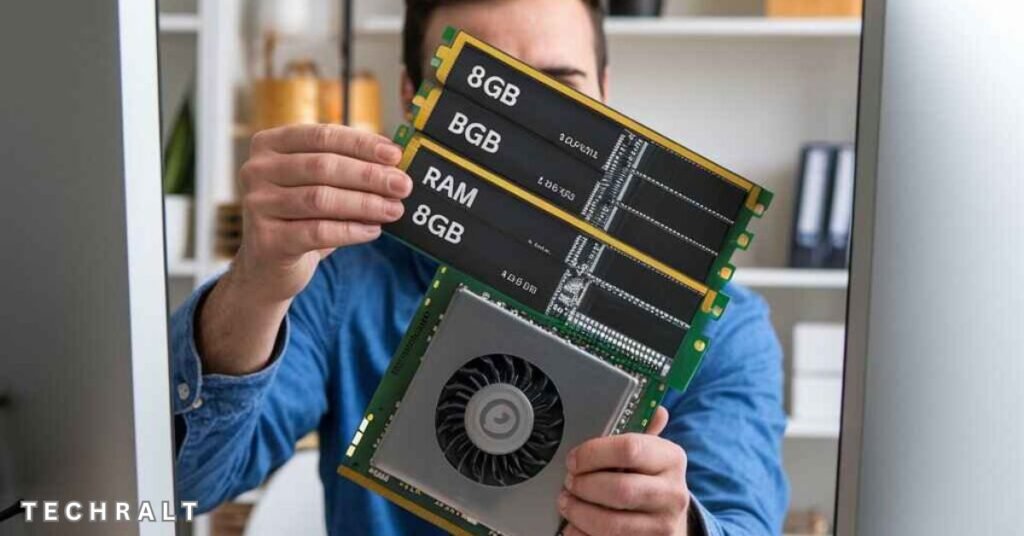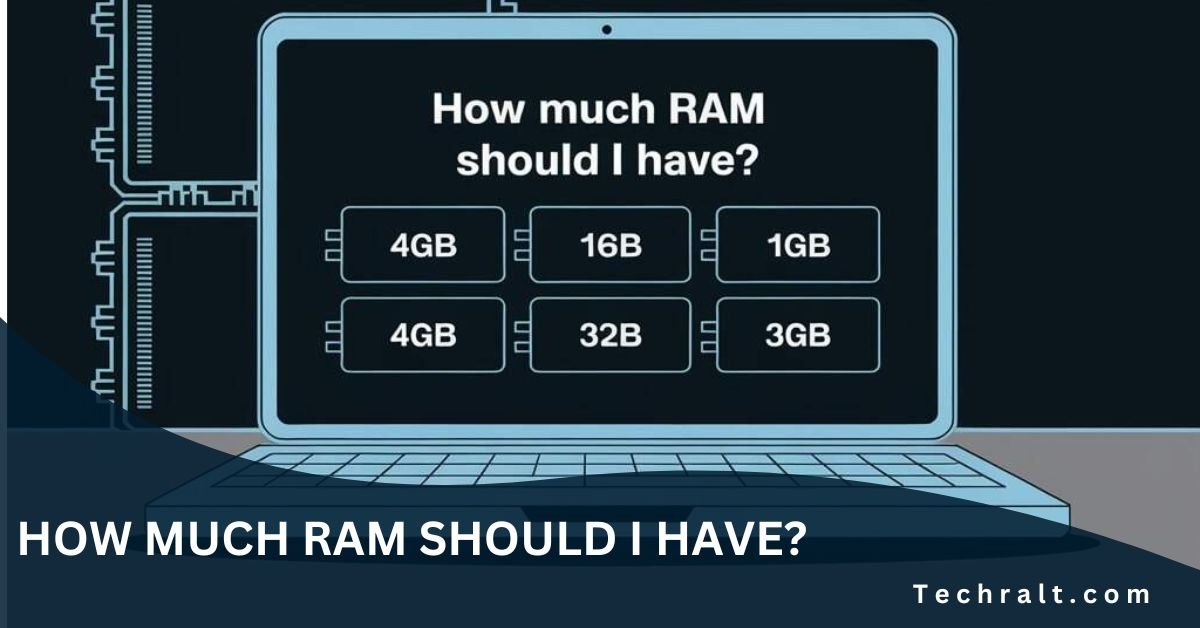I remember the first time I upgraded my computer’s RAM, thinking it would solve all my performance issues—only to realize I hadn’t considered how much RAM I actually needed.
So, how much RAM should you have? For most users, 8GB handles basic tasks, 16GB is perfect for gaming and multitasking, while 32GB or more is ideal for professionals.
In the following guide, I’ll walk you through the specific RAM requirements for different user profiles and help you determine the right amount of RAM for your needs.
How Much RAM Do You Need? – Find Out!
Determining the right amount of RAM is crucial for ensuring your computer runs smoothly and efficiently. The amount of RAM you need depends on how you use your computer. For casual users, a smaller amount of RAM might suffice, but for gamers, professionals, or those who frequently multitask, more RAM is often necessary. Let’s explore the different RAM configurations and see what they offer.
Is 4GB of RAM Enough? – Keep Reading!
Basic Tasks and Casual Use
For basic tasks like web browsing, checking emails, and word processing, 4GB of RAM can be sufficient, especially if you’re using a lightweight operating system or older hardware. However, in 2024, even casual users might find 4GB limiting, especially with modern browsers and applications that demand more resources.
The Downsides
With only 4GB of RAM, multitasking becomes a challenge, and you’ll likely notice your system slowing down when you try to open multiple tabs or applications. Upgrading to a minimum of 8GB is advisable if you want a smoother experience.
Is 8GB of RAM Enough? – Check This!
Everyday Use
For most everyday tasks, 8GB of RAM is often considered the sweet spot. It allows you to comfortably browse the web, stream videos, and run office applications without significant slowdowns. Many budget laptops and desktops come with 8GB of RAM, making it a popular choice for average users.
Gaming and Light Professional Work
When it comes to gaming, 8GB of RAM can handle many older or less demanding games. However, for newer titles or light professional work like photo editing, you might start to notice limitations. If you’re a casual gamer or use your computer for light professional tasks, 8GB might be enough, but be prepared for potential upgrades in the future.
8GB RAM for Professional Software: A Limitation?
If you’re using professional software like Adobe Photoshop, Premiere Pro, or CAD programs, how much RAM you should have is even more critical. These applications are memory-intensive and can quickly use up 8GB, leading to slowdowns or crashes. For professionals, 16GB or even 32GB is recommended to ensure that your system can handle large files and complex tasks without breaking a sweat.
Multitasking with 8GB RAM: What to Expect
Multitasking is where the amount of RAM you have really starts to show its importance. With 8GB of RAM, you can comfortably run a few applications at the same time—think web browsing, music streaming, and document editing. However, if you start adding in more resource-heavy tasks, like video editing or gaming, while keeping those applications open, you may start to feel the strain. So, how much RAM should you have if you’re a multitasker? 16GB is often the sweet spot for those who demand more from their machines.
Upgrading from 8GB: When and Why?
If you’re asking yourself how much RAM should I have, and you already have 8GB, you might be considering an upgrade. The need to upgrade usually comes down to whether your current setup is limiting your productivity or gaming experience. If you find your system lagging or frequently hitting the memory limit, it’s a clear sign that an upgrade is needed. Moving to 16GB or even 32GB can provide a noticeable boost in performance, allowing you to multitask more efficiently and run more demanding applications.

8GB RAM and Future-Proofing: Should You Upgrade?
With technology advancing rapidly, future-proofing your system is an important consideration. As new software and games continue to require more memory, how much RAM should you have to stay ahead? While 8GB may be sufficient today, it’s likely that 16GB or more will become the new standard in the near future. Investing in additional RAM now can save you from needing to upgrade again soon.
Is 16GB of RAM Too Much? – Upgrade Today!
Gaming and Professional Software
For gamers and professionals using demanding software, 16GB of RAM is often recommended. This amount of RAM can handle modern games, video editing, graphic design, and programming with ease. It also allows for better multitasking, enabling you to run multiple applications simultaneously without significant performance drops.
Future-Proofing
16GB of RAM also offers a degree of future-proofing. As software continues to evolve and become more resource-intensive, having 16GB ensures that your system will remain capable for several years. It’s a solid investment for anyone looking to keep their computer running smoothly in the long term.
Is 32GB RAM overkill? – Future-Proof!
For Power Users
For most users, 32GB of RAM might seem like overkill, but for power users—those who run virtual machines, heavy-duty video editing, 3D rendering, or intensive gaming—it can be a necessity. 32GB of RAM ensures that even the most demanding tasks can be handled simultaneously without any lag or slowdown.
Long-Term Investment
While 32GB of RAM may not be necessary for everyone, it’s an excellent choice for those who want to future-proof their system. With software continually becoming more resource-hungry, 32GB can provide peace of mind and exceptional performance for years to come.
Is 16 GB RAM enough? – Go Beyond!
Extreme Use Cases
64GB of RAM is beyond what most users will ever need. It’s typically reserved for extreme use cases, such as professional video editing, large-scale scientific simulations, or running multiple virtual machines at once. If you’re asking how much RAM should you have and considering 64GB, it’s likely because you have very specific, high-demand requirements.
Is It Worth It?
For the average user, 64GB of RAM is definitely overkill. However, for professionals in certain fields, it can be a game-changer. If you’re dealing with massive datasets, complex 3D models, or running several demanding programs simultaneously, 64GB could be worth the investment.
RAM Usage in Different Operating Systems!
Different operating systems manage RAM usage in unique ways, which can affect how much RAM you should have. For instance, Windows 10 and 11 are known for being memory-hungry, often using 2-3GB of RAM just for the OS. macOS is more efficient, but still, 8GB can feel tight with multiple apps open. Linux, on the other hand, is generally more lightweight, meaning you might get by with less. However, if you’re running virtual machines or doing heavy development work, more RAM is always better, regardless of the OS.
FAQs:
Is it normal to use 80% of RAM?
Typically, RAM usage should be 50% or less when your computer is idle. Using 80% of RAM regularly could suggest that an upgrade is needed, particularly if you’re frequently multitasking or using resource-heavy applications.
How much RAM do I need for Windows 11?
While Windows 11 can run on 4GB of RAM, 8GB is recommended for better performance, and 16GB for a smooth experience with multitasking and gaming.
Can I upgrade my RAM later?
Most laptops and desktops allow for RAM upgrades. However, it’s important to check your system’s specifications and limitations before purchasing additional RAM.
Does more RAM always mean better performance?
Not necessarily. More RAM helps with multitasking and handling large files, but if your current usage doesn’t max out your existing RAM, upgrading may not result in noticeable improvements.
What’s the difference between DDR4 and DDR5 RAM?
DDR5 is the latest generation of RAM, offering higher speeds and efficiency compared to DDR4. However, DDR5 is also more expensive and may not be necessary for all users.
Verdict:
So, how much RAM should you have? The answer depends on what you use your computer for. For most everyday tasks, 8GB may be enough. However, if you’re into gaming, professional software, or heavy multitasking, upgrading to 16GB or more is highly recommended. Future-proofing your system by opting for more RAM now can save you from needing an upgrade later, ensuring smooth performance for years to come.

